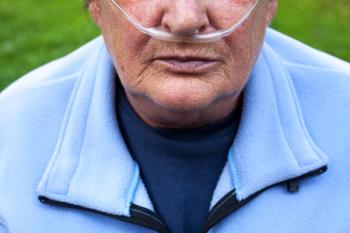
A study released Monday used national Medicare data to try and understand disparities between black and white patients in avoidable hospitalizations for ambulatory care–sensitive conditions.
Allison is Associate Editorial Director for The American Journal of Managed Care® (AJMC®) and The Center for Biosimilars®. She joined AJMC® in 2017. She produces and oversees written, video, and podcast content across several disease states and issues surrounding value-based care and health policy.
She has an MPA from New York University. You can connect with Allison on LinkedIn.

A study released Monday used national Medicare data to try and understand disparities between black and white patients in avoidable hospitalizations for ambulatory care–sensitive conditions.

Physicians at a community oncology clinic center have an increased understanding of the clinical utility of molecular testing after implementing next generation sequencing and precision medicine, said researchers.

Helping patients find a clinician who is experienced with sickle cell disease can have many positive benefits, a new study noted.

To help patients and their caregivers cope, the National Comprehensive Cancer Network (NCCN) this week completed a 3-book series that explains care and management options for those with head and neck cancer.

The Association of Accessible Medicines (AAM), which supports biosimilar development, argues that even if the Affordable Care Act (ACA) is overturned by the Supreme Court later this year, the Biologics Price Competition and Innovation Act (BPCIA) is severable and should survive.

President Trump announced the plan today at the White House, accompanied by insulin manufacturers Eli Lilly, Novo Nordisk, and Sanofi, as well as AHIP and major health plans.

Compared with use of originator products, use of biosimilars in the United States is apparently still not a priority of commercial health plans, according to the results of a recent JAMA study.

Glucocorticoid-refractory acute graft-versus-host disease (GVHD) develops in approximately 50% of allogeneic stem-cell recipients and is a major cause of death.

The therapy is for patients with deleterious or suspected deleterious germline somatic homologous recombination repair (HRR) gene–mutated cancer or for those whose cancer has progressed after prior treatment with enzalutamide or abiraterone.

When deciding which treatments to cover, states and commercial payers must wrestle with opportunity costs as new therapeutics come to market. A panel at Virtual ISPOR 2020 discussed some of the factors that go into those decisions.

At the opening session of this year's Virtual ISPOR 2020 conference, panelists shared their views on what future health care systems can learn from the current pandemic crisis.

Two of the panelists appearing during the Virtual ISPOR 2020 meeting preview what's needed in improving value assessment: Lou Garrison, PhD, of the University of Washington, and Leah Howard, JD, of the National Psoriasis Foundation.

To mark the 25th anniversary of the journal, each issue in 2020 will include an interview with a healthcare thought leader. For the May issue, we turned to Larry Levitt, MPP, executive vice president for health policy for the Kaiser Family Foundation.

A novel treatment that reprogrammed the skin cells of a single patient with Parkinson disease (PD) to replace cells in the brain improved symptoms over 24 months, according to a study published Wednesday, although researchers cautioned that a longer, more diverse clinical trial is needed to demonstrate results.

Although pulmonary rehabilitation for chronic obstructive pulmonary disease (COPD) is linked to better survival, a large study of fee-for-service (FFS) Medicare patients show it is underused, with less than 2% of those studied taking part in a 3-month program.

A study published this week found that germline testing of pediatric and young adult patients with cancer demonstrates that some tumors have actionable genetic variants.

Overall, biosimilar rituximab was used in more than 50% of patients, both as first-line therapy, second line or later.

HHS will divide the remaining $70 billion of financial assistance included in the bipartisan CARES Act to providers and hospitals by 4 tranches, saying the money would also be used to provide care for the uninsured who are ill with coronavirus disease 2019.

The American Journal of Managed Care® (AJMC®) recently spoke with Dinesh Kapur, MD, of Eastern Connecticut Hematology and Oncology, also known as ECHO, an advanced community oncology conference. Kapur spoke about how the value of community oncology, clinicial trials, and how staff are spending remote work days developing artificial intelligence (AI) tools for predictive patient analytics to improve care.

At the 2020 Community Oncology Conference, hosted by the Community Oncology Alliance, Howard "Skip" Burris III, MD, FACP, FASCO, president, chief medical officer, and executive director of drug development for Sarah Cannon Research Institute, will discuss "The Now and Future of Clinical Trials in the Community Oncology Setting." The American Journal of Managed Care® recently spoke with Burris, who is wrapping up his term as president of the American Society of Clinical Oncology, about how the coronavirus disease 2019 pandemic is affecting clinical trials as well as other aspects of the future of patient care in community oncology settings.

Psoriasis typically emerges among the young, while Alzheimer disease is mainly a disorder of old age, raising the question of whether psoriasis has an impact on the later development of neurodegenerative diseases.

A recent subgroup analysis showed that once-weekly dosing of carfilzomib and dexamethasone reduced the risk of disease progression or death and increased overall response rates in most examined patient subgroups with relapsed and rerefractory multiple myeloma. Multiple myeloma is the third most common hematologic malignancy worldwide, characterized by excessive proliferation of monoclonal plasma cells.

The Community Oncology Alliance (COA) said it is worried that the safety of patients with cancer will be compromised if home infusion regulatory changes, brought about by the coronavirus disease 2019 (COVID-19) pandemic, expand; other groups support the changes, which affect Medicare patients using Part B drugs.

Anthony Fauci, MD, the director of the National Institute of Allergies and Infectious Diseases, said he thinks the country is on track to see a decline of coronavirus disease 2019 (COVID-19) but said life will not go back to the way it was before. Fauci was interviewed by the JAMA editor-in-chief, who also spoke with former Utah Governor Michael Leavitt about state and federal roles in a pandemic.

To mark the 25th anniversary of the journal, each issue in 2020 will include an interview with a healthcare thought leader. For the April issue, we turned to Sherry Glied, PhD, dean of New York University’s Robert F. Wagner Graduate School of Public Service.

A large-scale study reports that patients with chronic obstructive pulmonary disease (COPD)—even if they never smoked—have a 2.6 times greater incidence of developing lung cancer compared with those who had neither COPD or a history of smoking.

The changes are aimed at helping hospitals increase their capacities for the sickest patients; expand the pool of local healthcare providers who are available to work; eliminating ordinary paperwork and documentation requirements; expanding Medicare coverage for respiratory-related devices and equipment for any medical reason; and expanding telehealth in Medicare by covering more than 80 additional services.

Dapagliflozin is currently indicated as an adjunct to diet and exercise to improve glycemic control in adults with type 2 diabetes (T2D). In the United States, it is also approved to reduce the risk of hospitalization for heart failure in patients with T2D and established cardiovascular (CV) disease or multiple CV risk factors.

Extending school and workplace closures in Wuhan until April would likely delay a second wave of coronavirus disease 2019 (COVID-19) cases until October, rather than August, and cut new infections by 24%, said a recent report.

As the Affordable Care Act (ACA) turns 10 years old, the coronavirus pandemic is focusing a spotlight on the coverage gains made under the landmark law.

259 Prospect Plains Rd, Bldg H
Cranbury, NJ 08512
© 2025 MJH Life Sciences®
All rights reserved.
